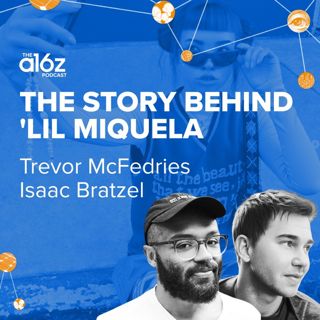
Digital Humans and the Story Behind Lil Miquela
You’ve probably heard of ‘Lil Miquela. The 19 year-old Brazilian-American influencer has millions of followers and has partnered with the likes of Samsung and Prada. But despite capturing the hearts of many, she’s not real. But you probably haven’t heard her origin story. In this episode we take a trip back to 2016, to a world that looked much different to today, together with two of Miquela’s creators – Trevor McFedries and Isaac Bratzel – cofounder and Chief Design and Innovation Officer of Brud at the time.We learn what inspired the experiment and what early signs indicated that Miquela was not just a novel idea. In a world where spinning up an influencer, we learn what it took to capture mindshare, the pushback they’ve received, what a “scalable influencer” means, and what they think is to come. Resources:‘Lil Miquela on Instagram: https://www.instagram.com/lilmiquela/‘Lil Miquela on Youtube: https://www.youtube.com/channel/UCWeHb_SrtJbrT8VD-_QQpRAFind Trevor on Twitter: https://twitter.com/whatdotcd?lang=enFind Isaac on Twitter: https://twitter.com/izykbenjaminFind Brud on Instagram: https://www.instagram.com/brud.fyiIsaac’s new avatar company: https://www.avataros.com/ Timestamps:00:00 - Introduction02:18 - The key insight04:05 - A new breed of influencers06:25 - Miquela’s aesthetic09:30 - Early signs of success13:01 - Narrative and fan engagement16:45 - The technology18:14 - Expanding past Miquela22:34 - Traction and generative AI26:45 - A new reality31:55 - Early pushback33:38 - Misunderstanding reality36:23 - Fear of new technologies37:47 - New technological unlocks41:13 - Scalable influencersStay Updated: Find a16z on Twitter: https://twitter.com/a16zFind a16z on LinkedIn: https://www.linkedin.com/company/a16zSubscribe on your favorite podcast app: https://a16z.simplecast.com/Follow our host: https://twitter.com/stephsmithioPlease note that the content here is for informational purposes only; should NOT be taken as legal, business, tax, or investment advice or be used to evaluate any investment or security; and is not directed at any investors or potential investors in any a16z fund. For more details please see a16z.com/disclosures. Stay Updated:Find a16z on XFind a16z on LinkedInListen to the a16z Podcast on SpotifyListen to the a16z Podcast on Apple PodcastsFollow our host: https://twitter.com/eriktorenberg Please note that the content here is for informational purposes only; should NOT be taken as legal, business, tax, or investment advice or be used to evaluate any investment or security; and is not directed at any investors or potential investors in any a16z fund. a16z and its affiliates may maintain investments in the companies discussed. For more details please see a16z.com/disclosures. Hosted by Simplecast, an AdsWizz company. See pcm.adswizz.com for information about our collection and use of personal data for advertising.
30 Mars 202345min

The Marketplace 100: A Glimpse Into the Future of Commerce
Over the last decade, we’ve seen the marketplace model evolve and grow, and this year a16z is back with our fourth edition of the Marketplace100 – a ranking of the top private marketplaces by GMV – giving a unique window into what may be to come.This year’s list features nearly three dozen newcomers, including marketplaces for refurbished electronics, precious metals, and sustainably raised meat. And in this episode, we break down key trends from the report together with a16z’s Consumer partners Connie Chan, Olivia Moore, and Zach Cohen.If you’d like to see the full ranking of the largest consumer-facing marketplace startups and private companies, you can find the full report at https://a16z.com/marketplace-100.Resources:Find the full Marketplace 100 report: https://a16z.com/marketplace-100Find Connie on Twitter: https://twitter.com/conniechanFind Olivia on Twitter: https://twitter.com/omooretweetsFind Zach on Twitter: https://twitter.com/zachcohen25Topics Covered:00:00- Introduction02:28 - Why marketplaces? 05:18 - What metrics matter07:55 - Newcomers on the list09:49 - Entertainment and personalization13:46 - Curated marketplaces14:47 - Trust and safety21:23 - Mental health trends22:42 - Untapped supply24:40 - Disintermediation27:42 - Transient vs foundational trends31:33 - Companies entering the category36:52 - Sleeper categories for 2024 Stay Updated: Find a16z on Twitter: https://twitter.com/a16zFind a16z on LinkedIn: https://www.linkedin.com/company/a16zSubscribe on your favorite podcast app: https://a16z.simplecast.com/Follow our host: https://twitter.com/stephsmithioPlease note that the content here is for informational purposes only; should NOT be taken as legal, business, tax, or investment advice or be used to evaluate any investment or security; and is not directed at any investors or potential investors in any a16z fund. For more details please see a16z.com/disclosures. Stay Updated:Find a16z on XFind a16z on LinkedInListen to the a16z Podcast on SpotifyListen to the a16z Podcast on Apple PodcastsFollow our host: https://twitter.com/eriktorenberg Please note that the content here is for informational purposes only; should NOT be taken as legal, business, tax, or investment advice or be used to evaluate any investment or security; and is not directed at any investors or potential investors in any a16z fund. a16z and its affiliates may maintain investments in the companies discussed. For more details please see a16z.com/disclosures. Hosted by Simplecast, an AdsWizz company. See pcm.adswizz.com for information about our collection and use of personal data for advertising.
23 Mars 202347min
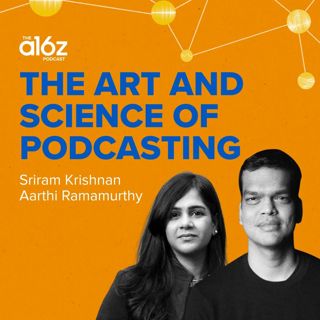
The Art and Science of Podcasting
It’s both easier and harder than ever to build a successful podcast. In this episode, we chat with Sriram and Aarthi from the Good Time Show, who ventured into the world of audio peak pandemic and have since interviewed the likes of Elon Musk, Calvin Harris, and Naomi Osaka.We get their perspective on how to succeed in this competitive landscape, differentiation and the sliding scale of entertainment and information, the difference between an audience and a community, podcast analytics and how they’re changing, and even what Sriram has learned from his frontrow experience at Twitter recently.Topics Covered:00:00 - Intro02:20 - Podcast trivia06:07 - Starting a podcast08:45 - Differentiating13:10 - Information vs entertainment18:08 - Getting off the talk track20:40 - Growth and metrics22:31 - Authenticity27:10 - Secret sauce of podcasting28:10 - Advice for new podcasters29:58 - In-person events32:06 - Tech as a force for good34:50 - The next wave of social37:23 - Creator middle class41:16 - Podcast infrastructure42:55 - ChatGPT45:10 - Swapping lives with a celebrity52:26 - Your personal monopoly Resources:Find Sriram on Twitter: https://twitter.com/sriramkFind Aarthi on Twitter: https://twitter.com/aarthirFind Aarthi and Sriram on Youtube: https://www.youtube.com/@AarthiAndSriramCheck out the Good Time Show: https://www.aarthiandsriram.com/ Stay Updated: Find us on Twitter: https://twitter.com/a16zFind us on LinkedIn: https://www.linkedin.com/company/a16zSubscribe on your favorite podcast app: https://a16z.simplecast.com/Follow our host: https://twitter.com/stephsmithioPlease note that the content here is for informational purposes only; should NOT be taken as legal, business, tax, or investment advice or be used to evaluate any investment or security; and is not directed at any investors or potential investors in any a16z fund. For more details please see a16z.com/disclosures. Stay Updated:Find a16z on XFind a16z on LinkedInListen to the a16z Podcast on SpotifyListen to the a16z Podcast on Apple PodcastsFollow our host: https://twitter.com/eriktorenberg Please note that the content here is for informational purposes only; should NOT be taken as legal, business, tax, or investment advice or be used to evaluate any investment or security; and is not directed at any investors or potential investors in any a16z fund. a16z and its affiliates may maintain investments in the companies discussed. For more details please see a16z.com/disclosures. Hosted by Simplecast, an AdsWizz company. See pcm.adswizz.com for information about our collection and use of personal data for advertising.
20 Mars 202351min
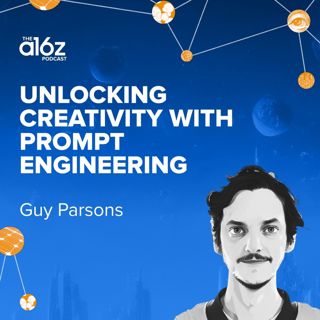
Unlocking Creativity with Prompt Engineering
With every new technology, some jobs are lost while others are gained. People often focus on the former, but in this episode we chose to highlight the latter – a highly creative role that emerges alongside AI: the prompt engineer.Until AI can close the loop of its own, each tool still requires a set of prompts. Just like a composer feeds an instrument the notes to play, a prompt engineer feeds an AI a map of what to produce. And if we know anything from music it’s that composing great music takes great skill!In this episode we explore the emerging importance of prompting with Guy Parsons, the early learnings of how to do it effectively, and where this field might be going.Will the prompt engineer be more like the highly sought after DevOps engineer, or a proficiency like Excel that you find on every resume? Listen in to hear Guy’s take.Interested in the prompt competition? Email us at podpitches@a16z.com.Resources:DALL-E 2 Prompt Book: https://dallery.gallery/the-dalle-2-prompt-book/Find Guy on Twitter: https://twitter.com/GuyPGuy’s combining image experiment: https://twitter.com/GuyP/status/1612880405207580672Guy’s amorphous prompt experiment: https://twitter.com/GuyP/status/1608475973300948993Guy’s space duck: https://twitter.com/GuyP/status/1601342688225525761Prompt base: https://promptbase.com/Lexica: https://lexica.art/ Topics Covered: 0:00 - Introduction01:49 - DALL-E 2 Prompt Book05:29 - Parallel skills06:51 - 80/20 prompting10:16 - New ways of prompting13:44 - Pulling the AI slot machine18:09 - Comparing models21:04 - Requested features26:34 - Learning with AI27:58 - Practical use cases32:08 - A top 1% prompt engineer36:17 - The most popular images Stay Updated: Find us on Twitter: https://twitter.com/a16zFind us on LinkedIn: https://www.linkedin.com/company/a16zSubscribe on your favorite podcast app: https://a16z.simplecast.com/Follow our host: https://twitter.com/stephsmithioPlease note that the content here is for informational purposes only; should NOT be taken as legal, business, tax, or investment advice or be used to evaluate any investment or security; and is not directed at any investors or potential investors in any a16z fund. For more details please see a16z.com/disclosures. Stay Updated:Find a16z on XFind a16z on LinkedInListen to the a16z Podcast on SpotifyListen to the a16z Podcast on Apple PodcastsFollow our host: https://twitter.com/eriktorenberg Please note that the content here is for informational purposes only; should NOT be taken as legal, business, tax, or investment advice or be used to evaluate any investment or security; and is not directed at any investors or potential investors in any a16z fund. a16z and its affiliates may maintain investments in the companies discussed. For more details please see a16z.com/disclosures. Hosted by Simplecast, an AdsWizz company. See pcm.adswizz.com for information about our collection and use of personal data for advertising.
9 Mars 202338min

Rebooting the Arsenal of Democracy with Palmer Luckey
Starting in the 1960s, technology companies, funded by the U.S. Department of Defense, were essential for creating the processors that would eventually launch satellites and guide missiles. Half a century later, today’s tech companies can — and need — to move even faster and smarter, as international adversaries scale up their aggressions. In this episode, Anduril Industries Founder Palmer Luckey will discuss how Silicon Valley is using new technologies to build new tools, systems, and companies to defend our nation and its interests. Resources:American Dynamism Summit: https://a16z.com/AD-summit/Anduril’s website: https://www.anduril.com/Find Palmer on Twitter: https://twitter.com/PalmerLuckey Stay Updated: Find a16z on Twitter: https://twitter.com/a16zFind a16z on LinkedIn: https://www.linkedin.com/company/a16zSubscribe on your favorite podcast app: https://a16z.simplecast.com/Follow our host: https://twitter.com/stephsmithioPlease note that the content here is for informational purposes only; should NOT be taken as legal, business, tax, or investment advice or be used to evaluate any investment or security; and is not directed at any investors or potential investors in any a16z fund. For more details please see a16z.com/disclosures. Stay Updated:Find a16z on XFind a16z on LinkedInListen to the a16z Podcast on SpotifyListen to the a16z Podcast on Apple PodcastsFollow our host: https://twitter.com/eriktorenberg Please note that the content here is for informational purposes only; should NOT be taken as legal, business, tax, or investment advice or be used to evaluate any investment or security; and is not directed at any investors or potential investors in any a16z fund. a16z and its affiliates may maintain investments in the companies discussed. For more details please see a16z.com/disclosures. Hosted by Simplecast, an AdsWizz company. See pcm.adswizz.com for information about our collection and use of personal data for advertising.
7 Mars 202318min
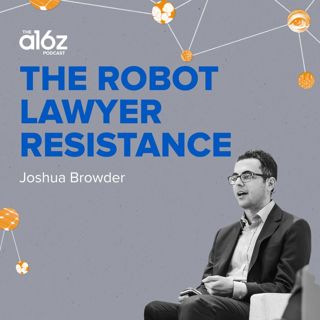
The Robot Lawyer Resistance
What happens when you don’t have the resources to fight for your rights? Whether it’s a major medical bill or a more minor parking ticket… even if you were in the right, is it easier to just… pay?Well, Joshua Browder's answer is Do Not Pay! He’s built a thriving company of the same name, that helps consumers “fight corporations, beat bureaucracy, and sue anyone at the press of a button.” Through the power of technology, DoNotPay has resolved over 2m cases successfully and in this interview we get to hear where Browder hopes to take the organization, including his first-hand account of his recent plan to bring the robot lawyer into the physical courtroom. Topics Covered:00:00 - Introduction01:51 - DoNotPay’s origin03:09 - Surprising laws05:49 - General counsel for consumers06:54 - The role of AI and technology09:26 - Ensuring quality counsel13:19 - Prioritizing features14:43 - Corporate pushback17:11 - Reshaping the legal system20:28 - Entering the physical courtroom 24:50 - Cross border possibilities26:14 - Looping humans into modeling29:01 - Deflationary impacts30:05 - Recent pushback33:13 - Is AI already writing law?35:15 - Why is law so complex?37:54 - Entering the Supreme Court38:38 - Lawyer support39:47 - Looking forward43:07 - Building horizontal vs vertical45:28 - Does this law exist? Resources: DoNotPay: https://donotpay.com/Find Josh on Twitter: https://twitter.com/jbrowder1 Stay Updated: Find a16z on Twitter: https://twitter.com/a16zFind a16z on LinkedIn: https://www.linkedin.com/company/a16zSubscribe on your favorite podcast app: https://a16z.simplecast.com/Follow our host: https://twitter.com/stephsmithioPlease note that the content here is for informational purposes only; should NOT be taken as legal, business, tax, or investment advice or be used to evaluate any investment or security; and is not directed at any investors or potential investors in any a16z fund. For more details please see a16z.com/disclosures. Stay Updated:Find a16z on XFind a16z on LinkedInListen to the a16z Podcast on SpotifyListen to the a16z Podcast on Apple PodcastsFollow our host: https://twitter.com/eriktorenberg Please note that the content here is for informational purposes only; should NOT be taken as legal, business, tax, or investment advice or be used to evaluate any investment or security; and is not directed at any investors or potential investors in any a16z fund. a16z and its affiliates may maintain investments in the companies discussed. For more details please see a16z.com/disclosures. Hosted by Simplecast, an AdsWizz company. See pcm.adswizz.com for information about our collection and use of personal data for advertising.
1 Mars 202348min
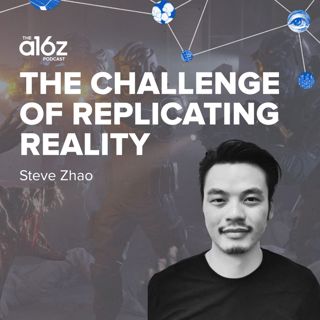
The Challenge of Replicating Reality
What would you do if you believed in an idea but everyone said it would fail, nobody would fund you, and the industry was experiencing a nuclear winter?Despite experiencing exactly that, Sandbox VR founder Steve Zhao doubled down and invested all of his personal savings into the unproven business. 7 years and 1 bankruptcy later, Steve has built the world’s leading full-body VR experience with over 30 locations across the globe. In this interview, we get to chat with Steve about the many challenges he faced, how Sandbox made it through the pandemic, the future of VR, and the difficult task of tackling hardware, software, a new computing platform, and real estate. Resources:Check out Sandbox VR: https://sandboxvr.comFind Steve Zhao on Twitter: https://twitter.com/zhaosaurusLearn more about the Squid Game partnership: https://venturebeat.com/games/squid-game-is-coming-to-sandbox-vr-immersive-experience-locations/Watch Steph’s highlight video: https://sandboxvr.com/event/b0b22aad-7c73-475d-ab43-281a456ff590 Stay Updated: Find us on Twitter: https://twitter.com/a16zFind us on LinkedIn: https://www.linkedin.com/company/a16zSubscribe on your favorite podcast app: https://a16z.simplecast.com/Follow our host: https://twitter.com/stephsmithioPlease note that the content here is for informational purposes only; should NOT be taken as legal, business, tax, or investment advice or be used to evaluate any investment or security; and is not directed at any investors or potential investors in any a16z fund. For more details please see a16z.com/disclosures. Stay Updated:Find a16z on XFind a16z on LinkedInListen to the a16z Podcast on SpotifyListen to the a16z Podcast on Apple PodcastsFollow our host: https://twitter.com/eriktorenberg Please note that the content here is for informational purposes only; should NOT be taken as legal, business, tax, or investment advice or be used to evaluate any investment or security; and is not directed at any investors or potential investors in any a16z fund. a16z and its affiliates may maintain investments in the companies discussed. For more details please see a16z.com/disclosures. Hosted by Simplecast, an AdsWizz company. See pcm.adswizz.com for information about our collection and use of personal data for advertising.
22 Feb 202356min
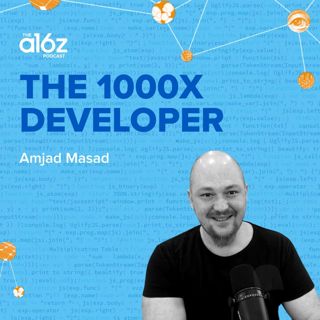
The 1000x Developer
A small minority – likely less than 1% – of the world can code. Yet also widely known that the skillset tends to yield outsized returns, with developers generating some of the highest paying salaries out there.But the field is quickly shifting, especially with the advent of wide-scale AI. In this podcast, we get to chat with Amjad Masad, founder of Replit, about these foundational shifts.We cover how Replit has integrated AI into its platform and the implications on both current and future developers. It’s easier than ever to learn to code, but is it still worthwhile? Listen in to find out.Timestamps:00:00 - Introduction02:04 - What is Replit?04:15 - Stories behind Replit11:10 - The software hero’s journey13:09 - Making coding fun15:58 - AI powering software19:37 - Training your own models22:36 - Building UX around AI24:16 - The developer landscape26:23 - The 1000x engineer30:40 - Should you still learn to code?34:41 - What does AI enable?40:54 - Developing on mobile43:24 - A software labor market45:53 - Differentiating a marketplace48:23 - Building new market dynamics50:45 - Looking aheadResources: Replit: https://replit.com/Replit Ghostwriter: https://replit.com/site/ghostwriterReplit Bounties: https://replit.com/bountiesFind Amjad on Twitter: https://twitter.com/amasad Stay Updated: Find us on Twitter: https://twitter.com/a16zFind us on LinkedIn: https://www.linkedin.com/company/a16zSubscribe on your favorite podcast app: https://a16z.simplecast.com/Follow our host: https://twitter.com/stephsmithioPlease note that the content here is for informational purposes only; should NOT be taken as legal, business, tax, or investment advice or be used to evaluate any investment or security; and is not directed at any investors or potential investors in any a16z fund. For more details please see a16z.com/disclosures. Stay Updated:Find a16z on XFind a16z on LinkedInListen to the a16z Podcast on SpotifyListen to the a16z Podcast on Apple PodcastsFollow our host: https://twitter.com/eriktorenberg Please note that the content here is for informational purposes only; should NOT be taken as legal, business, tax, or investment advice or be used to evaluate any investment or security; and is not directed at any investors or potential investors in any a16z fund. a16z and its affiliates may maintain investments in the companies discussed. For more details please see a16z.com/disclosures. Hosted by Simplecast, an AdsWizz company. See pcm.adswizz.com for information about our collection and use of personal data for advertising.
16 Feb 20231h





















